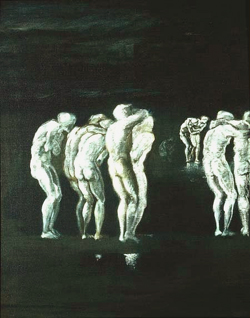|
|

Souls on the
Banks of the River Styx
Sir Edward Coley Burne-Jones (1833-1898)
|
|
|
|
|
S T Y X
|
|
The latest one movement, masterfully wrought symphonic work by Spanish composer Octavio Vazquez, entitled “Styx”, seemingly takes its inspiration from the river Styx, which according to ancient Greek mythology served as a crossroads where the world of the mortal came into contact with the world of the immortal. The Styx was crossed by the Gods, villains heroic figures and mortals, and in some sense served as the superhighway of the immortals, yet for the majority of those who crossed it -the mortals- their trip lead directly to their death and obliteration.
Vazquez begins his twenty five minute work on a note evoking the stench and the almost palpable foulness of the dreaded black hued river. It was said that the river was so foul to drink that it brought instant death and others said that it bubbled with fire. This macabre visage is brought to horrific life in the opening of this piece.
There is a battle of forces in the development section, there is always ever-present the looming gloom of the Styx river, but there are moments and even entire passages that give way to a glimmer of light, I would almost suggest hope amidst the blackness. This waxing and waning quality begins to predominate toward the closing minutes of Vazquez’ dramatic composition and makes one think that our composer had, in addition to the river alone as his sole inspiration, a certain mythological figure in mind that he, in effect, weaves through “Styx” or rather superimposes onto the piece acting as a contrasting theme and this figure is Tantalus (origin of the verb “tantalize”). Tantalus, was the mortal son of Zeus, who is known to posterity for serving to the Gods -in lieu of ambrosia- the butchered remains of his own son Pelops at a banquet that he hosted. The Gods, insulted and abhorring human sacrifice of any kind, devised as a proper punishment for Tantalus’ sacrificial slight placed him in a body of water where fruit was abundant and water surrounded him, yet when Tantalus attempted to reach for the fruit on the vines, they would magically recede beyond his reach And when he tried to sip the water that surrounded him, it would recede beyond his lips. Vazquez’ Styx could very easily possess the subtitle of “The Torment of Tantalus”. For we are perpetually tantalized throughout this work by Vazquez’ tempting lyrical fruits of hope and sublime chords of refreshment, and are actually at certain points in the piece convinced that our humble souls may be redeemed and we can taste of the fruit, drink of the water, witness the light and pass the dreaded Styx unscathed; but, alas, Vazquez, at the end of our journey, ruthlessly and painfully intimates that these comforts are only meant for the Gods.
Marc Anthony Hatsis
Tuxedo Park, New York, 2005
|
|
|
|
|
|





